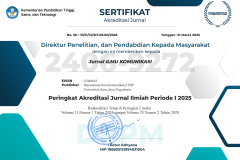Indonesian Women’s Activism in Social Media: A Virtual Ethnography Study in the Instagram
DOI:
https://doi.org/10.24002/jik.v18i2.3343Keywords:
digital culture, social media, women’s activism, women’s movementAbstract
Instagram is widely used to create accounts for women’s activism. Some of thoseaccounts are managed by Indonesian, such as @indonesiafeminis, @perempuanbergerak, @womensmarchjkt, @perempuanberkisah.id, and @lawanpatriarki. They disseminate informationand knowledge on feminism, women empowerment, and gender equality among Indonesian youth.The research aims to analyze how the movements occur through Instagram and portrayals ofperspective on women empowerment. This research is conducted with the virtual ethnographymethod. This study finds that the movement of women’s activism accounts in social media platformsis deconstructed towards the common view of women empowerment and gender equality.
References
Aripurnami, Sita, et al. (2013). Indonesian Women’s Movement: Making Democracy Gender Responsive. Women Research Institute.
Arimbi. (2009). Reading Contemporary Indonesian Muslim Women Writers. Amsterdam University Press.
Arivia, Gadis. (2006). Feminisme Sebuah Kata Hati. Jakarta: Kompas.
Arivia, Gadis & Nur Iman Subono. (2017). A Hundred Years of Feminism in Indonesia: An Analysis of Actors, Debates and Strategies. Jakarta: Friedrich-Ebert-Stiftung.
Blackburn, Susan. (2004). Women and the State in Modern Indonesia. Cambridge, UK: Cambridge University Press.
Blackburn, Susan. (2007). Kongres Perempuan Pertama: Tinjauan Ulang. Yayasan Obor Indonesia.
Budianta, Melanie. (2003). The Blessed Tragedy: The Making of Women’s Activism during Reformasi Years in Heryanto and Mandal, Challenging Authoritarianism in Southeast Asia, New York: Routledge.
Dijck, Jose van. (2013). The Culture of Connectivity: A Critical History of Social Media. New York: Oxford University Press.
Dilli, Selin, Sarah G. Carmichael & Auke Rijpma. (2019) “Introducing the Historical Gender Equality Index”. Feminist Economics. 1, 31-57, DOI: 10.1080/13545701.2018.1442582
Durham, Meenakshi Gigi & Douglas Kellner (ed.). (2006). Media and Cultural Studies: KeyWorks Revised Edition. Oxford: Blackwell Publishing.
Hine, Christine. (2000). Virtual Ethnography. London: SAGE Publications.
Lovenduski, Joni. (2005). State Feminism and Political Representation. NY: Cambridge University Press.
KOWANI. (2009). Derap Langkah Pergerakan Organisasi Perempuan Indonesia. Jakarta: PT Pustaka Sinar Harapan.
McCann, et al. (2003). Feminist Theory Reader: Local and Global Perspectives. Routledge.
McLuhan, Marshall & Lewis H. Lapham. (1994). Understanding Media: The Extensions of Man. Cambridge: MIT Press.
Prensky, Marc. (2001). “Digital Natives, Digital Immigrants”. On the Horizon. MCB University Press, Vol. 9 No. 5, October 2001, pp. 1-6, https://doi.org/10.1108/10748120110424816
Robinson, Kathryn & Sharon Besell. (2002). Women in Indonesia, Gender, Equity and Development. Singapore: ISEAS.
Roces, Mina & Louise Edwards. (2010). Women’s Movements in Asia: Feminism and Transnational Activism. London and New York: Routledge.
Suryakusuma, Julia. (2011). State Ibuism: The Social Construction of Womenhood in New Order Indonesia. Komunitas Bambu.
Subono, Nur Iman (ed). (1999). Catatan Perjalanan Suara Ibu Peduli, Jakarta: YJP Press.
Sunstein, Cass R. (2001). Echo Chambers: Bush V. Gore, Impeachment, and Beyond. New Jersey: Princeton University Press.
Vreedee-De Stuers, Cora. (2008). Sejarah Perempuan Indonesia: Gerakan dan Pencapaian, Indonesian translation edition. Komunitas Bambu.
Wieringa, Saskia Eleonora. (1999). Penghancuran Gerakan Perempuan di Indonesia. Indonesian translation edition. Garba Budaya and Kalyanamitra.
Downloads
Published
How to Cite
Issue
Section
License
Jurnal ILMU KOMUNIKASI is an academic journal. As such, it is dedicated to the open exchange of information. For this reason, JIK is freely available to individuals and institutions. Authors who publish in Jurnal ILMU KOMUNIKASI will release their articles under the Creative Commons Attribution (BY) License. This license allows anyone to copy and redistribute the article in any medium or format as well as remix, transform, and build upon the material for any purpose, even commercially as long as they credit the authors for the original creation. For details of the rights authors grants users of their work, see the "human-readable summary" of the license, with a link to the full license. (Note that "you" refers to a user, not an author, in the summary)
 This work is licensed under a Creative Commons Attribution 4.0 International License.
This work is licensed under a Creative Commons Attribution 4.0 International License.














